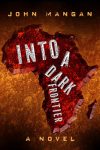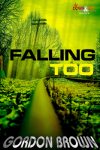

October 2 – 8: “Are some careers more suitable for characters in thrillers than others?”
 Are some careers more suitable for characters in thrillers than others? That’s the question facing ITW Members Andrew Mayne, Bob Bickford, J. J. Hensley, John Mangan, Neil S. Plakcy, Linda Stasi and Gordon Brown this week. Scroll down to the “comments” to follow what is sure to be a thrilling discussion!
Are some careers more suitable for characters in thrillers than others? That’s the question facing ITW Members Andrew Mayne, Bob Bickford, J. J. Hensley, John Mangan, Neil S. Plakcy, Linda Stasi and Gordon Brown this week. Scroll down to the “comments” to follow what is sure to be a thrilling discussion!
~~~~~
 J.J. Hensley is a former police officer and former Special Agent with the U.S. Secret Service. He the author of the crime novels BOLT ACTION REMEDY, RESOLVE, MEASURE TWICE, CHALK’S OUTLINE, and several short stories. RESOLVE was a Thriller Award Finalist in 2014.
J.J. Hensley is a former police officer and former Special Agent with the U.S. Secret Service. He the author of the crime novels BOLT ACTION REMEDY, RESOLVE, MEASURE TWICE, CHALK’S OUTLINE, and several short stories. RESOLVE was a Thriller Award Finalist in 2014.
 When he was little, Bob Bickford haunted the library. He hunted for good stories, got lost in pages, and daydreamed about becoming a writer. When he got older, real life got in the way. The dream was filed under ‘impossible things’, and nearly forgotten. After years spent in various corners of the United States and Canada, he dusted off his imagination and became a writer-by-night. He hunts for good stories once again, and he still haunts the library.
When he was little, Bob Bickford haunted the library. He hunted for good stories, got lost in pages, and daydreamed about becoming a writer. When he got older, real life got in the way. The dream was filed under ‘impossible things’, and nearly forgotten. After years spent in various corners of the United States and Canada, he dusted off his imagination and became a writer-by-night. He hunts for good stories once again, and he still haunts the library.
 Lt. Col (R) John Mangan is a decorated combat rescue pilot, novelist and coffeehouse poet. He is a graduate of the United States Air Force Academy, was an instructor at the Survival Escape Resistance & Evasion (SERE) school, and was an HH-60G, Pave Hawk instructor pilot. He has deployed to the Middle East eight times and has commanded the 33rd Expeditionary Rescue Squadron in Kandahar, Afghanistan. His actions in combat have been documented in the books Not a Good Day to Die, None Braver, and Zero Six Bravo. He has flown combat missions with PJs, SEALs, Delta, Rangers, and the SAS. John has been awarded the Distinguished Flying Cross with Valor twice, The Air Medal twelve times, and the 2009 Cheney Award.
Lt. Col (R) John Mangan is a decorated combat rescue pilot, novelist and coffeehouse poet. He is a graduate of the United States Air Force Academy, was an instructor at the Survival Escape Resistance & Evasion (SERE) school, and was an HH-60G, Pave Hawk instructor pilot. He has deployed to the Middle East eight times and has commanded the 33rd Expeditionary Rescue Squadron in Kandahar, Afghanistan. His actions in combat have been documented in the books Not a Good Day to Die, None Braver, and Zero Six Bravo. He has flown combat missions with PJs, SEALs, Delta, Rangers, and the SAS. John has been awarded the Distinguished Flying Cross with Valor twice, The Air Medal twelve times, and the 2009 Cheney Award.
 Neil S. Plakcy has written or edited over three dozen novels and short stories in mystery, romance and erotica. To research the Angus Green series, he participated in the FBI’s sixteen-week citizen’s academy, practiced at a shooting range, and visited numerous gay bars in Fort Lauderdale. (Seriously, it was research.) He is an assistant professor of English at Broward College in South Florida, and has been a construction manager, a computer game producer, and a web developer – all experiences he uses in his fiction.
Neil S. Plakcy has written or edited over three dozen novels and short stories in mystery, romance and erotica. To research the Angus Green series, he participated in the FBI’s sixteen-week citizen’s academy, practiced at a shooting range, and visited numerous gay bars in Fort Lauderdale. (Seriously, it was research.) He is an assistant professor of English at Broward College in South Florida, and has been a construction manager, a computer game producer, and a web developer – all experiences he uses in his fiction.
 Gordon Brown lives in Scotland. He has delivered pizzas in Toronto, compered the main stage at a two-day music festival, floated a high-tech company on the stock market and was once booed by 49,000 people while on the pitch at a major football Cup Final. Today, Gordon also runs a creativity training business called Brain Juice and is a DJ on local radio. Gordon helped found Bloody Scotland—Scotland’s International Crime Writing Festival—and has been writing since his teens. He has five crime and thriller novels to his name.
Gordon Brown lives in Scotland. He has delivered pizzas in Toronto, compered the main stage at a two-day music festival, floated a high-tech company on the stock market and was once booed by 49,000 people while on the pitch at a major football Cup Final. Today, Gordon also runs a creativity training business called Brain Juice and is a DJ on local radio. Gordon helped found Bloody Scotland—Scotland’s International Crime Writing Festival—and has been writing since his teens. He has five crime and thriller novels to his name.
 Linda Stasi, the popular and well-read columnist for the New York Daily News, and previously for the New York Post, has also been an on-camera TV co-host with Mark Simone for the past 18 years on NY 1 – Spectrum’s “What a Week!” She was named “One of the Fifty Most Powerful Women in NYC” and has won numerous awards. She is a two-time winner of Best Column by the Newswomen’s Club of NY, Best Humor Columnist, and named Woman of the Year by the Boys Town of Italy for her charitable work such as driving a tractor-trailer in an 18-truck convoy from NYC to the gulf states with hurricane relief supplies.
Linda Stasi, the popular and well-read columnist for the New York Daily News, and previously for the New York Post, has also been an on-camera TV co-host with Mark Simone for the past 18 years on NY 1 – Spectrum’s “What a Week!” She was named “One of the Fifty Most Powerful Women in NYC” and has won numerous awards. She is a two-time winner of Best Column by the Newswomen’s Club of NY, Best Humor Columnist, and named Woman of the Year by the Boys Town of Italy for her charitable work such as driving a tractor-trailer in an 18-truck convoy from NYC to the gulf states with hurricane relief supplies.
 Andrew Mayne is the star of A&E’s Don’t Trust Andrew Mayne, and he’s performed his unique brand of illusion on five continents, his YouTube videos have millions of views and he’s cultivated thousands of fans for his magic, books and podcasts calling themselves ‘Mayniacs’. Beyond magic, Andrew Mayne is also the author of five bestselling mystery and thriller books. His recent thriller, Angel Killer, the story of a female FBI agent with a background magic, was the fifth best selling independent novel in the United Kingdom in 2012. His podcast, Weird Things is also one of the top science and nature podcasts on iTunes.
Andrew Mayne is the star of A&E’s Don’t Trust Andrew Mayne, and he’s performed his unique brand of illusion on five continents, his YouTube videos have millions of views and he’s cultivated thousands of fans for his magic, books and podcasts calling themselves ‘Mayniacs’. Beyond magic, Andrew Mayne is also the author of five bestselling mystery and thriller books. His recent thriller, Angel Killer, the story of a female FBI agent with a background magic, was the fifth best selling independent novel in the United Kingdom in 2012. His podcast, Weird Things is also one of the top science and nature podcasts on iTunes.
- LAST GIRL MISSING with K.L. Murphy - July 25, 2024
- CHILD OF DUST with Yigal Zur - July 25, 2024
- THE RAVENWOOD CONSPIRACY with Michael Siverling - July 19, 2024
